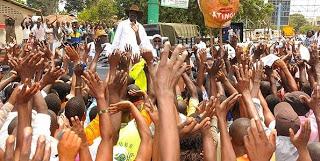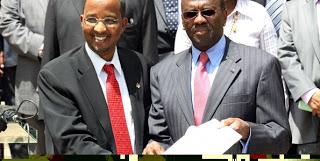

[...] acknowledged greetings from Prime Minister Raila Odinga (atop
his car) before he addressed them" and proclaim himself winner of
March 4 presidential poll.)
***
(PHOTO 2: Kenya Independent Electoral and Boundaries Commission
Chairman Issack Hassan, left, "presents the certificate of
presidential results to Chief Justice Dr. Willy Mutunga at the Supreme
Court in Nairobi, March 11, 2014.")
***
There are two age-old African presidential-election-cycle shibboleths.
The first one--now rare--is the Ivorian kind of shibboleth where, as
it happened in 2010 in Côte d'Ivoire, the electoral commission, whose
majority of members were the incumbent's political clients and tribal
allies, aided and abetted electoral fraud.
The most common shibboleth nowadays, however, is this second one,
where a losing (opposition) candidate--with the bloated ego of a
madman--defying statistical and sociological logic, claims to be the
rightful winner of the poll.
(In this crazy post-apocalyptic world, there's no such thing as the
swift concession defeat like the one made by then Senegalese President
Abdoulaye Wade made in April 2012 to rival Macky Sall. Here, people
have to die for the narrow ambitions of a sociopath.)
This latter shibboleth is often accompanied by another minor
shibboleth--a sub-shibboleth, as it were--which consists in
systematically denigrating the country's so-called independent
electoral commission.
This happened in the DRC where opposition leader Etienne Tshisekedi so
successfully demonized the Independent National Electoral Commission
(CENI) and its chairman before, during, and after the November 2011
general elections that many citizens ended up losing confidence in an
institution created by their own representatives in Parliament and
whose members were rigorously vetted and chosen by the National
Assembly.
Rejecting the results of the presidential election, Tshisekedi refused
nevertheless to petition the Supreme Court, the constitutional
arbiter, charging that the entire judiciary of the DRC was populated
by creatures entirely beholden to President Joseph Kabila.
Upping the ante not only on the ruling majority but on his own party
as well, Tshisekedi barred his party members freshly elected as MPs
from taking their seats in Parliament.
All MPs belonging to his party--with the exception of his own son and
sister--chose to disobey this directive.
Tshisekedi retaliated by excluding all of them from his party--though
some pro-Kabila MPs are now expressing misgivings about Tshisekedi's
son and sister continuing to be paid huge salaries as MPs, in blatant
violation of stringent and clear-cut attendance rules of the National
Assembly.
In some cases, the madman would even come out and proclaim himself
president-elect, and hope, against all odds, that somehow, the
"imperium" would be conferred upon him, his family, his entourage and
his tribe.
This is what happened in the DRC where, to this day, Tshisekedi still
deludes himself of being the president of the republic.
The delusions of these presidential election madmen and fraudsters are
often heightened by election monitoring organizations, like the Carter
Center, which would point to apparent poll irregularities.
In Kenya, the situation was slightly different at first, then it
somewhat rejoined the DRC narrative.
Both running presidential tickets--Uhuru Kenyatta and running mate
William Ruto on the one hand; and Raila Amollo Odinga aka RAO and
Deputy President candidate Stephen Kalonzo Musyoka--were all
incumbents, as they all belonged to the grand coalition government
brokered after the debacle of the 2007 presidential election.
Odinga, who lost to Kenyatta in the March 4, 2013 presidential
election, came out at first as a reasonable fellow, backing, prior to
the poll, Chairman Issack Hassan and the other 8 members of the
Independent Electoral and Boundaries Commission (IEBC).
Then, as the results of the election started trickling in--after a
massive glitch of the IEBC electronic system--and as Kenyatta took an
early lead, Odinga and Kalonzo denounced a flawed electoral process
and demanded that the count be halted.
On March 11, the IEBC announced the winner of the presidential
election as Kenyatta. Its chairman, Issack Hassan, then went to
present both president-elect Kenyatta and Chief Justice Dr. Willy
Mutunga a so-called "certificate of presidential results."
Refusing to concede defeat, Odinga, alongside a civil society group
whose leadership is uncannily mostly made of the Luo--Odinga's ethnic
group--filed a petition in the Supreme.Court to declare Kenyatta win
"null and void" as the poll was a "sham" and a "travesty" as RAO kept
repeating at rallies and press briefings.
Odinga even clamored that "dark forces" were working deep inside the IEBC!
Whereas in the DRC Tshisekedi had dismissed justices of the Supreme
Court as Kabila's henchmen, in Kenya, Odinga was training the big guns
of his coalition on the IEBC while heaping praise on the Supreme
Court.
Odinga was even quoted as saying:
"The one institution in which all Kenyans still have faith is our new
Judiciary. It is faith-based on their achievements in the last two
years."
He then urged his "brother" Kenyatta to join him in pledging to accept
the Supreme Court ruling--whatever the outcome.
One could sense that Odinga was clearly emboldened by the pending
trial of president-elect Uhuru Kenyatta and his deputy president-elect
William Ruto at the International Criminal Court (ICC).
He might have wrongly calculated that the time was ripe for him to
seize power from his weakened rival.
While his petition was still pending in the Supreme Court, however,
Odinga cranked up several notches his assault on (and contempt of) the
electoral commission when, at a rally on March 18, Odinga claimed he'd
won the election with 5.7 million votes against Kenyatta's 4.5 million
votes--though it is still a mystery as tow how Odinga got those
numbers.
This prompted the Kenyan Supreme Court to slap gag orders on the
petitioners and the presumptive winner and their lawyers, while--thank
God!--Inspector-General of Police David Kimaiyo banned all "illegal
groupings" around the Supreme Court in Nairobi and political rallies
countrywide.
Police boss Kimaio explained the "move [as] aimed at ensuring that we
do not elicit unnecessary emotions, or generate apprehension or even
tension."
Odinga is indeed aiming at stirring tension, violence, and mayhem.
This is a calculated strategy that could, he hopes, lead to another
coalition government.
In initiating this dangerous maneuver, Odinga emerges as Africa's
scumbag of the year 2013.
***
PHOTO CREDITS: PHOTO 1: Gideon Maundu/ nation.co.ke; PHOTO 2: Via nation.co.ke
